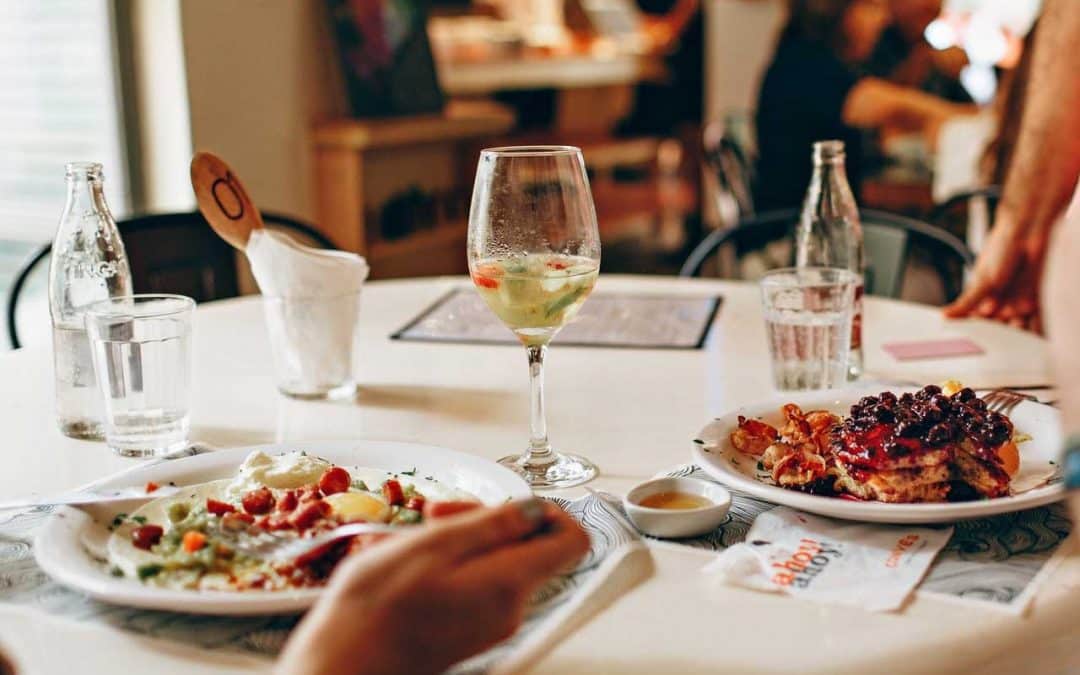This is something I see time and time again – clients come in with great incomes, yet very little savings, thanks to common lifestyle decisions that are eating away at their future financial security. In contrast, I have also had clients who are not only surviving but thriving on a low wage and when I ask how they have managed to scramble together their home deposit, it comes down to the savy things they do and more importantly the things they don’t do, to keep their budget in check!
Here is a list I have put together to help you reign in your expenses and get your bank balance back in the black. You will note that most of these suggestions are not big expenses in their own right, but when you tackle a few of them, you will quickly see how these little things can add up and transform your finances.
- Dining out: If you love eating out and refuse to give it up, then you need to be smart about it. Go out less frequently, order an entrée-sized serve instead of a main and BYO wine if possible. You can also purchase voucher books, and follow your faves on social media for special deals.
- Alcohol: You don’t need to become a sober Sally to save money, but you do need to reconsider the way you consume alcohol. Mixed drinks at a bar can be upwards of $15, for a beverage you could have whipped up at home for less than $4! If you commit to following the Australian guidelines on alcohol consumption (remember, they differ for men and women), you will improve your health along with your budget.
- Cigarettes: A pack a day habit could be eating into your savings (and your lungs) to the tune of $14,000 each year. But if you have tried to quit and failed, you are not alone! Many smokers attempt it several times before they successfully ditch the habit. There is so much out there to help these days, from hypnosis to nicotine replacement therapy, and even medication. Speak to your GP or call the Quitline for advice.
- Taxis and Ubers: Another benefit of cutting back on alcohol is that you will be able to drive home, saving you money on taxis and Ubers. Sometimes these services are a godsend but do try to minimise how often you are using them. Take it in turns to drive with your friends, and chip in for petrol and parking to make it even more affordable.
- Takeout lunches: One of the simplest changes you can make to improve your finances is to start taking your own lunch to work. Focaccia for lunch and coffee and a muffin for morning tea each day from the local café could see you spending around $100 per week on lunches – that’s $5,000 per year! If you do not have time to throw together a sandwich in the morning, take dinner leftovers instead.
- Netflix: Streaming services like Netflix can actually save you money if you stay in and binge-watch instead of going out to the movies, but many of us do both. If you decide to keep Netflix, Stan or any other subscription, include it as part of your entertainment budget and do not double-dip. And make sure you’re on the most appropriate subscription level for your needs, rather than paying more for extra screens or channel packs you don’t use.
- Foxtel: You can’t subscribe to every single service out there and expect to save money, and luckily, gone are the days that Foxtel commanded a monopoly over our pay-TV options. If you can’t bring yourself to give it up completely, at least cut down to a more basic package, or switch to a cheaper streaming option like Foxtel Play.
- Pre-cut produce: Not only are you paying more for the convenience but pre-cut fruit and vegetables also tend to be wrapped in tonnes of plastic, which isn’t great for the planet. It only takes a few minutes to prepare vegetables for the week, and you can store them in containers in the fridge until they’re needed.
- Gym memberships & personal trainers: The fitness industry is booming, and its meteoric rise relies on two things – your lack of knowledge, and your lack of motivation. Do a little research of your own to find out what exercise regime will work for you, then invest in a couple of essentials for home workouts – a set of dumbbells, a yoga mat, and a resistance band is a good start – and commit to working up a sweat in your lounge room. If staying motivated is your problem, enlist a friend to be your accountability buddy.
- Lottery tickets: How many people do you know who’ve won millions on Powerball? I’m guessing it’s zero. The odds of winning the lottery are insanely low, and your $20 weekly ticket is de-railing your savings by $1000 per year. Time to give it up.
- Takeaway Coffee: $3 to $4 a pop, your takeaway coffee habit could be costing you upwards of $2,500 per year! I’m not suggesting you need to swap your barista blend for a cheap jar of instant, but there are ways to get your caffeine fix and save cash at the same time. A good home coffee machine will set you back a few hundred dollars. Team it with your favourite beans or ground coffee and you’ll have a café quality beverage in your Keep Cup at a fraction of the price.
- Holidays & weekends away: Research special deals, take advantage of off-peak periods and discount vouchers, and be prepared to make some sacrifices so you can travel on a budget. Some ideas I’ve picked up from clients include choosing accommodation with a stove and microwave, so you can cook your own meals and keep your food spend down, and travelling during school terms when the kids are young. Not only is this cheaper, but you’ll also spend less time fighting your way through big crowds.
- Fast Food: Fast food isn’t just unhealthy, it’s also becoming more and more expensive. A trip to the drive-thru for a family of four could set you back around $40, and ordering home delivery through your favourite app can cost even more. Plan ahead and avoid the money trap. When you make a curry or casserole, make extra and freeze it for busy nights, and keep some frozen fish and chips on hand for when the kids feel like a special treat for dinner. Master the art of “fakeaway” and watch your monthly food spend drop!
- Manicures & pedicures – Personal grooming is a high priority for many, but it also comes with a lofty price tag. You don’t have to give it all up so instead prioritise the things that are most important to you and cut back on those you’re less bothered about.
- New clothes: How many of the garments have you worn in the past six months? How many still have tags on them? And how many are you holding onto, just in case you lose weight or they come back into fashion? You really don’t need any new clothes, but if you’re feeling like a change, why not arrange a clothes swap with friends?
- Brand name clothing: When you buy something from a big brand, you’re paying for the label, not necessarily the quality of the item. Often, garments are made in the same factories anyway, with a different tag sewn on at the very end (this goes for lots of products, from shampoo to biscuits)! Instead of dressing according to brand names and trends, dress to suit your personal style and body shape.
- Gambling: When you gamble, the only winner is the casino or betting agency. If you’re struggling to give up this habit, speak to a qualified counsellor and put some strategies in place.
- Pre-prepared food: Yes, it’s convenient, but it’s also hugely overpriced. Curry for two at $15 a pop? You could whip that up for around $5 and have leftovers for the freezer. Microwave rice, four small serves for $4? Why, when you already own several pots and can grab a huge bag of basmati from the grocery store super-cheap? Going back to basics in the kitchen can save you so much money, and you’ll have control over exactly what’s in your food: win-win.
- House cleaning: This is a hard one to part with for busy working mums and dads, but it could save you loads of money. If you have older children, ask them to complete some of the household tasks for extra pocket money. Or, make a master list and tackle one or two jobs each day so it doesn’t become overwhelming. There are loads of tips and tricks you can find online that will help you keep your home clean and organised, without being chained to the sink.
- Children’s activities: many child development experts believe kids these days are over-scheduled and far too “busy”, thanks to all the extra-curricular activities we have them enrolled in. Instead of signing them up to everything under the sun, allow them to pick one activity each per term, and take advantage of the free things on offer in your neighbourhood, such as the local library, park and bike track.
 Louisa Sanghera is a Finance Broker for Residential Mortgages, Vehicle and Asset Finance, Commercial Lending and Budgeting and Cashflow Coaching with Zippy Financial.
Louisa Sanghera is a Finance Broker for Residential Mortgages, Vehicle and Asset Finance, Commercial Lending and Budgeting and Cashflow Coaching with Zippy Financial.
She has gained more than 30 years in the Banking and Finance Industry, and since founding Zippy Financial, has become a multi award-nominated expert in the field of finance featuring regularly in industry press and speaking at finance and investment seminars across the country.
Website: www.zippyfinancial.com.au
Email: louisa@zippyfinancial.com.au
Phone: 1300 855 022




